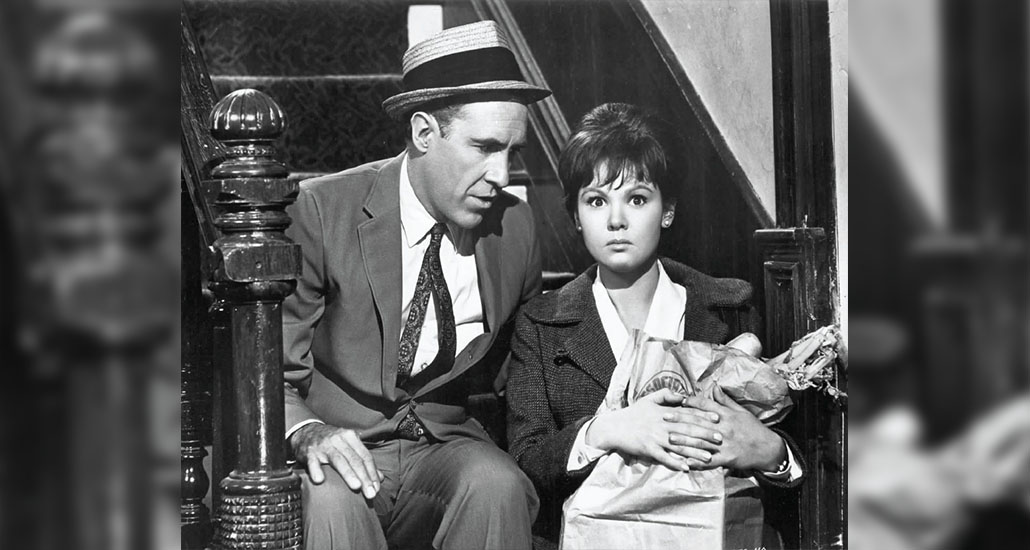by Paul J. Coyne
Though I will always appreciate my film classes at Fitchburg State College (Massachusetts), the greatest educator of cinema history I ever knew was a gentleman named George Allen.
Weekdays after school, long ago in the early 1980s, Allen took the time to show me cinema’s finest. It was he who introduced me to celluloid titans such as Casablanca, Citizen Kane, Sullivan’s Travels, Psycho and The Sweet Smell of Success. He also wasn’t averse to screening lesser-known films. I appreciated the chills of Targets or Night Must Fall and obscure comedies such as Champagne for Caesar, Start the Revolution Without Me, Lord Love a Duck and, what has become a personal favorite, A Thousand Clowns. My only issue with Allen was that every 15 minutes, he’d pick up the phone to give away money. I suppose as host of the Dialing for Dollars Movie, it was his job.
I first became interested in film as a kid when I uncloseted mom’s 8mm movie camera while searching for hidden Christmas gifts. Also, the local Kmart sold abridged 8mm versions of feature films. I purchased as many as my paper route salary could afford, which was a grand total of two: The African Queen and, new to Super-8, The Empire Strikes Back. In a fit of creative boredom, I eventually spliced them together into a single tale. Now, Bogie was averting asteroids and Germans were firing on X-Wings. Quite unexpectedly, I had discovered the magic of editing. I thus began to pay closer attention to juxtapositions on screen. In particular, I was most interested in the way editorial choices created new elements of story, humor and character.
That’s when Allen first screened A Thousand Clowns, starring Jason Robards, Barry Gordon, Barbara Harris and William Daniels. Released in 1966, Clowns received Oscar nominations for Best Picture and Best Editing (Ralph Rosenblum), and a win for Martin Balsam as Best Supporting Actor.
It often makes no linear sense and yet the sudden bursts of editorial energy reveal Murray Burns’s character more clearly than volumes of dialogue.
Clowns tells the story of electively unemployed comedy writer Murray Burns (Robards), and his semi-adopted son, Nick (Gordon). Nick’s mother, Murray’s sister, abandoned Nick years earlier and has since communicated “almost entirely by rumor.” In this relationship, Nick is clearly the parent. Murray spends days scouring junkyards for eagle statues, celebrating deli owner birthdays and organizing imaginary volleyball matches. Nick, who lacks an actual surname but must choose one by his 13th birthday, informs Murray that Social Services will soon pay a visit.
When officious inspectors Daniels and Harris arrive, Murray’s irascible nature finds an ample target. Daniels storms out, Harris stays, love begins and Murray faces a tragic dilemma: Gain responsibility or lose Nick. Clowns is a hilarious, startling mix of stage-bound dialogue scenes and wildly inventive montages scored by marches, Dixieland jazz and, occasionally, Robards strumming a ukulele.
When first we meet Murray and Nick roaming Manhattan, all manner of traditional cutting is eradicated. Single conversations span multiple locations, sometimes relocating mid-sentence. Location dialogue becomes voiceover. Sudden bursts of incongruous music catapult the viewer across time and space.
Later, as Murray ventures into the urban jungle to find employment, an escalating montage of pedestrians culminates in a literal shot of meat thrown to lions. An automat sandwich arrives with a side of The Hallelujah Chorus. It’s perfectly unstructured madness. Aside from enjoying Clowns’ humor and heart, it was an eye-opening experience for me. It often makes no linear sense and yet the sudden bursts of editorial energy reveal Murray’s character more clearly than volumes of dialogue.
Rosenblum’s autobiography, When the Shooting Stops…The Cutting Begins, details the road taken to find Clowns’ free-form style, after months of mundane, stagey rough cuts. As he later proved on films like the original The Producers and Annie Hall, the edit room is not the end of a process. It is a new beginning where convention is never limited by innovation. Rosenblum, like Murray, offered spontaneity and the invention of celebration. To my fertile eyes, he had smashed the boundaries of what I understood to be traditional film language. It was both inspired and inspiring.
Clowns is a hilarious, startling mix of stage-bound dialogue scenes and wildly inventive montages.
As an editor and producer, A Thousand Clowns inspires my work daily. Rosenblum and Clowns taught me that with imagination, there’s always a way to make an edit work, to make it funnier, to make the emotions more sincere and to deliver greater depth of character and story.
A Thousand Clowns concludes with a freeze frame, both tragic and exultant. When I first watched the film, that exultation enveloped me. The only thing that would have made it more glorious was if George Allen had phoned to offer me money.


